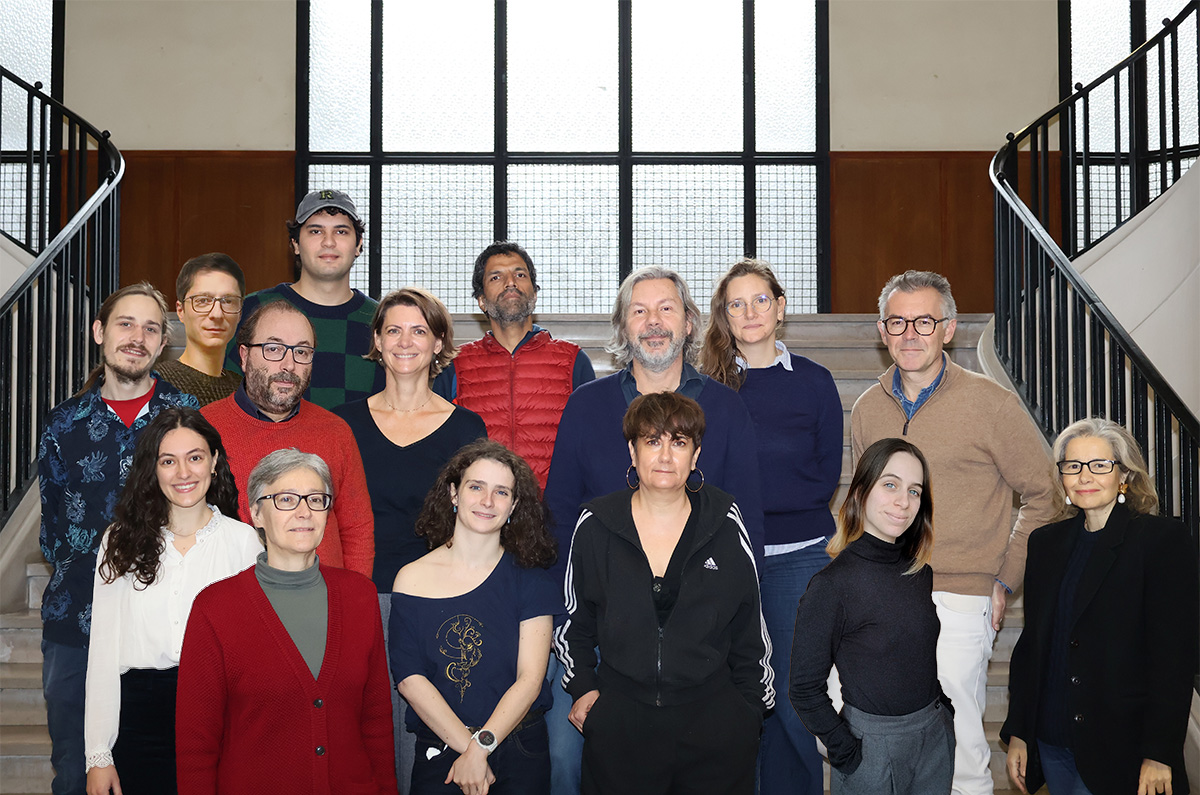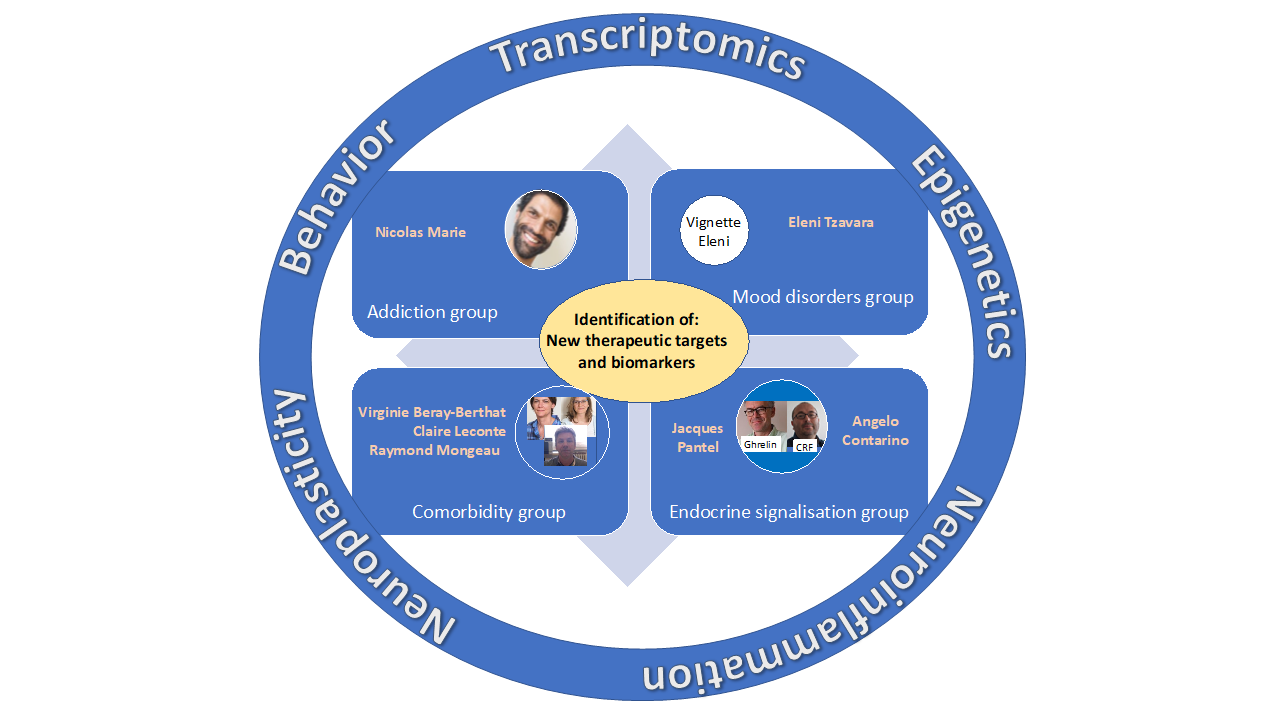Team 5 – Addictions and comorbidities: biomarkers, mechanisms and pharmacotherapies (PharmACoBio) CNRS EMR3649

© Tous droits réservés
The current purpose of neurobiological research on psychiatric diseases is to understand the genetic/epigenetic, cellular and molecular mechanisms that mediate the transition from physiological to pathological states. However, when it comes to relapses, in particular after long periods of recovery and abstinence, the international literature is very poor. The activity of our team aims to fill this gap. We are indeed interested in the long-term impact of the exposome (chemical and social) at a functional level (receptors, signal transduction, gene profiling, epigenetics regulation) and also by the characterization of peripheral prognostic biomarkers.
To answer our scientific questions, the team is made up of different groups (see illustration). These groups have a specific research focus, but the results obtained are shared between the other groups, enabling mutual enrichment of the research programs.
The addiction group (group leader: Nicolas Marie) aims to develop epigenomic and transcriptomic analysis to identify new therapeutic pathways and biomarkers for monitoring disease progression and therapeutic response. One of the group’s objectives is also to study the pharmacological impact of current clinical treatments on neuroplasticity induced by drugs of abuse (mainly opioids and cocaine). Integrated approaches are used for this purpose.
The co-morbidity group (group leaders: Raymond Mongeau, Virginie Beray-Berthat, Claire Leconte): the main aim of this group is to better understand the very high prevalence of co-morbidity between post-traumatic stress disorders (PTSD) and substance abuse. This is crucial, as studies have clearly shown that people suffering from co-occurring disorders have poorer therapeutic outcomes than those suffering from only one type of disorder. New therapeutic strategies must therefore be proposed. Integrated approaches are used for this purpose.
The mood disorders group (group leader: Eleni Tzavara): with a significant focus on the study of depression. Preclinically, this involves two-hit animal models with focus on female biological sex and adolescence as predisposing/stratifying factors in adverse outcome pathways. The group explores new therapeutic strategies, repurposing existing medication, and targeting neurotransmitter systems or signal transduction pathways. Eleni Tzavara is also involved in clinical practice, and is currently coordinating two newly established patient cohorts (GeBRA, trauma; ANTaRES, depression) aimed at advancing precision psychiatry. This provides further opportunities to strengthen ties with the clinic and to develop translational research on predictive and diagnostic biomarkers.
The neuroendocrine signaling axis group comprises two main axes: the Ghrelin system (led by Jacques Pantel) and the CRF system (led by Angelo Contarino). The results obtained clearly demonstrate the involvement of CRF in Substance Use Disorders (SUD). On the other hand there is mounting evidence suggesting that the ghrelin system may serve as a biomarker for assessing pathological states following environmental stressors of a chemical and/or social nature. Both systems may play a key role in relapse, the main problem in clinic. All our results highlight these systems as potential targets for new therapeutic strategies, with druggable targets.
Key words: addiction, stress, depression, therapeutic targets, biomarkers, behavior, epigenetics.

Permanent researchers

Support staff

Post docs and PhD students




Job offers
- Ouverture d’une Chaire Professeur Junior Inserm à l’Université Paris Cité (Paris, France) – documentation FR/EN
Journal articles
2023
- ref_biblio
- Nicolas Marie, Florence Noble. Oxycodone, an opioid like the others?. Frontiers in Psychiatry, 2023, 14, pp.1229439. ⟨10.3389/fpsyt.2023.1229439⟩. ⟨hal-04767364⟩
- Accès au texte intégral et bibtex
-


2021
- ref_biblio
- Geoffroy Goujon, Victor Baldim, Caroline Roques, Nicolas Bia, Johanne Seguin, et al.. Antioxidant activity and toxicity study of cerium oxide nanoparticles stabilized with innovative functional copolymers. Advanced Healthcare Materials, 2021, 10 (11), pp.2100059. ⟨10.1002/adhm.202100059⟩. ⟨hal-03452741⟩
- Accès au texte intégral et bibtex
-


- ref_biblio
- Candice Marion, Philippe Zizzari, Raphael G P Denis, Rim Hassouna, Yacine Chebani, et al.. The GhsrQ343X allele favors the storage of fat by acting on nutrient partitioning. Journal of Endocrinology, 2021, pp.JOE-20-0576.R2. ⟨10.1530/JOE-20-0576⟩. ⟨inserm-03365851v2⟩
- Accès au texte intégral et bibtex
-


- ref_biblio
- Melissa A Munn-Chernoff, Emma C Johnson, Yi-Ling Chou, Jonathan R.I. Coleman, Laura Thornton, et al.. Shared genetic risk between eating disorder- and substance-use-related phenotypes: Evidence from genome-wide association studies. Addiction Biology, 2021, 40, pp.e12880. ⟨10.1111/adb.12880⟩. ⟨inserm-02881410⟩
- Accès au texte intégral et bibtex
-


2020
- ref_biblio
- Jérôme Busserolles, Ismail Ben Soussia, Laetitia Pouchol, Nicolas Marie, Mathieu Meleine, et al.. TREK1 channel activation as a new analgesic strategy devoid of opioid adverse effects. British Journal of Pharmacology, 2020, 177 (20), pp.4782-4795. ⟨10.1111/bph.15243⟩. ⟨hal-03512213⟩
- Accès au texte intégral et bibtex
-


2019
- ref_biblio
- Hélène Geoffroy, Corinne Canestrelli, Nicolas Marie, Florence Noble. Morphine-Induced Dendritic Spine Remodeling in Rat Nucleus Accumbens Is Corticosterone Dependent. International Journal of Neuropsychopharmacology, 2019, 22 (6), pp.394-401. ⟨10.1093/ijnp/pyz014⟩. ⟨hal-02147545⟩
- Accès au texte intégral et bibtex
-


- ref_biblio
- Ralf Kuja-Halkola, Joanna Martin, Yi Lu, Christopher Hübel, Catarina Almqvist, et al.. Associations Between Attention-Deficit/Hyperactivity Disorder and Various Eating Disorders: A Swedish Nationwide Population Study Using Multiple Genetically Informative Approaches. Biological Psychiatry, 2019, 86 (8), pp.577-586. ⟨10.1016/j.biopsych.2019.04.036⟩. ⟨hal-02575225⟩
- Accès au bibtex
-

- ref_biblio
- Nicolas Marie, Corinne Canestrelli, Florence Noble. Role of pharmacokinetic and pharmacodynamic parameters in neuroadaptations induced by drugs of abuse, with a focus on opioids and psychostimulants. Neuroscience and Biobehavioral Reviews, 2019, 106, pp.217-226. ⟨10.1016/j.neubiorev.2018.06.006⟩. ⟨hal-02147556⟩
- Accès au texte intégral et bibtex
-


- ref_biblio
- Florence Noble, Nicolas Marie. Management of Opioid Addiction With Opioid Substitution Treatments: Beyond Methadone and Buprenorphine. Frontiers in Psychiatry, 2019, 9, pp.742. ⟨10.3389/fpsyt.2018.00742⟩. ⟨hal-02147550⟩
- Accès au texte intégral et bibtex
-


- ref_biblio
- Hunna Watson, Zeynep Yilmaz, Laura Thornton, Christopher Hübel, Jonathan Coleman, et al.. Genome-wide association study identifies eight risk loci and implicates metabo-psychiatric origins for anorexia nervosa. Nature Genetics, 2019, 51 (8), pp.1207-1214. ⟨10.1038/s41588-019-0439-2⟩. ⟨hal-02573041⟩
- Accès au bibtex
-

2018
- ref_biblio
- Zuzana Hajasova, Corinne Canestrelli, Francine Acher, Florence Noble, Nicolas Marie. Role of mGlu7 receptor in morphine rewarding effects is uncovered by a novel orthosteric agonist. Neuropharmacology, 2018, 131, pp.424-430. ⟨10.1016/j.neuropharm.2018.01.002⟩. ⟨hal-02147571⟩
- Accès au bibtex
-

- ref_biblio
- Sophie Lebourgeois, Catherine Vilpoux, Jérôme Jeanblanc, Francine Acher, Nicolas Marie, et al.. Pharmacological activation of mGlu4 and mGlu7 receptors, by LSP2-9166, reduces ethanol consumption and relapse in rat. Neuropharmacology, 2018, 133, pp.163-170. ⟨10.1016/j.neuropharm.2018.01.031⟩. ⟨hal-02147563⟩
- Accès au bibtex
-

2016
- ref_biblio
- Yacine Chebani, Candice Marion, Philippe Zizzari, Khadidja Chettab, Marie Pastor, et al.. Enhanced responsiveness of Ghsr Q343X rats to ghrelin results in enhanced adiposity without increased appetite. Science Signaling, 2016, 9 (424), pp.ra39. ⟨10.1126/scisignal.aae0374⟩. ⟨inserm-01463897⟩
- Accès au texte intégral et bibtex
-


- ref_biblio
- Marie Garraud, Kahina Khacef, Anne-Clémence Vion, Claire Leconte, Min Yin, et al.. Recombinant tissue plasminogen activator enhances microparticle release from mouse brain-derived endothelial cells through plasmin. Journal of the Neurological Sciences, 2016, 370, pp.187-195. ⟨10.1016/j.jns.2016.09.026⟩. ⟨hal-03367426⟩
- Accès au bibtex
-

- ref_biblio
- Magalie Lenoir, Florence Noble. Qu’apporte la neurobiologie aux addictions ?. La Presse Médicale, 2016, 45 (12), pp.1096-1101. ⟨10.1016/j.lpm.2016.02.021⟩. ⟨hal-02347858⟩
- Accès au bibtex
-

- ref_biblio
- Luca Posa, Alison Accarie, Florence Noble, Nicolas Marie. Methadone Reverses Analgesic Tolerance Induced by Morphine Pretreatment. International Journal of Neuropsychopharmacology, 2016, 19 (7), pyv108. ⟨10.1093/ijnp/pyv108⟩. ⟨hal-02147576⟩
- Accès au texte intégral et bibtex
-


2015
- ref_biblio
- Stéphane Allouche, Thierry Le Marec, Antoine Coquerel, Florence Noble, Nicolas Marie. Striatal dopamine D1 and D2 receptors are differentially regulated following buprenorphine or methadone treatment. Psychopharmacology, 2015, 232 (9), pp.1527-1533. ⟨10.1007/s00213-014-3785-x⟩. ⟨hal-02147637⟩
- Accès au bibtex
-

- ref_biblio
- Sandrine Geoffroy, Stéphanie Puig, Nadia Benturquia, Florence Noble. Temporal Regulation of Peripheral BDNF Levels during Cocaine and Morphine Withdrawal: Comparison with a Natural Reward. International Journal of Neuropsychopharmacology, 2015, 18 (5), pyu088 - pyu088. ⟨10.1093/ijnp/pyu088⟩. ⟨hal-01899919⟩
- Accès au bibtex
-

- ref_biblio
- Florence Noble, Magalie Lenoir, Nicolas Marie. The opioid receptors as targets for drug abuse medication. British Journal of Pharmacology, 2015, 172 (16), pp.3964-3979. ⟨10.1111/bph.13190⟩. ⟨hal-02147631⟩
- Accès au bibtex
-

2014
- ref_biblio
- Stephane Allouche, Florence Noble, Nicolas Marie. Opioid receptor desensitization: mechanisms and its link to tolerance. Frontiers in Pharmacology, 2014, 5, pp.280. ⟨10.3389/fphar.2014.00280⟩. ⟨hal-02149861⟩
- Accès au texte intégral et bibtex
-


- ref_biblio
- Corinne Canestrelli, Nicolas Marie, Florence Noble. Rewarding or aversive effects of buprenorphine/naloxone combination (Suboxone) depend on conditioning trial duration. International Journal of Neuropsychopharmacology, 2014, 17 (09), pp.1367-1373. ⟨10.1017/S146114571400025X⟩. ⟨hal-02154084⟩
- Accès au texte intégral et bibtex
-


- ref_biblio
- Maria Seleman, Hélène Chapy, Salvatore Cisternino, Cindie Courtin, Maria Smirnova, et al.. Impact of P-glycoprotein at the blood-brain barrier on the uptake of heroin and its main metabolites: behavioral effects and consequences on the transcriptional responses and reinforcing properties. Psychopharmacology, 2014, 231 (16), pp.3139 - 3149. ⟨10.1007/s00213-014-3490-9⟩. ⟨hal-01904771⟩
- Accès au texte intégral et bibtex
-


2013
- ref_biblio
- Stéphane Allouche, Thierry Le Marec, Florence Noble, Nicolas Marie. Different patterns of administration modulate propensity of methadone and buprenorphine to promote locomotor sensitization in mice. Progress in Neuro-Psychopharmacology and Biological Psychiatry, 2013, 40, pp.286-291. ⟨10.1016/j.pnpbp.2012.10.013⟩. ⟨hal-02154116⟩
- Accès au bibtex
-

- ref_biblio
- Fei Teng, Virginie Beray-Berthat, Bérard Coqueran, Clémentine Lesbats, Mélanie Kuntz, et al.. Prevention of rt-PA induced blood–brain barrier component degradation by the poly(ADP-ribose)polymerase inhibitor PJ34 after ischemic stroke in mice. Experimental Neurology, 2013, 248, pp.416-428. ⟨10.1016/j.expneurol.2013.07.007⟩. ⟨hal-02070926⟩
- Accès au bibtex
-

2012
- ref_biblio
- Lauren Faget, Eric Erbs, Julie Le Merrer, Gregory Scherrer, Audrey Matifas, et al.. In Vivo Visualization of Delta Opioid Receptors upon Physiological Activation Uncovers a Distinct Internalization Profile. Journal of Neuroscience, 2012, 32 (21), pp.7301 - 7310. ⟨10.1523/JNEUROSCI.0185-12.2012⟩. ⟨hal-01899922⟩
- Accès au texte intégral et bibtex
-


- ref_biblio
- Stéphanie Puig, Florence Noble, Nadia Benturquia. Short- and long-lasting behavioral and neurochemical adaptations: relationship with patterns of cocaine administration and expectation of drug effects in rats. Translational Psychiatry, 2012, 2 (10), pp.e175 - e175. ⟨10.1038/tp.2012.103⟩. ⟨hal-01899921⟩
- Accès au bibtex
-

2011
- ref_biblio
- Cynthia Marie-Claire, Thierry Le Marec, Cynthia Marie, Florence Noble, Nicolas Marie. Chronic and intermittent morphine treatment differently regulates opioid and dopamine systems: a role in locomotor sensitization. Psychopharmacology, 2011, 216 (2), pp.297 - 303. ⟨10.1007/s00213-011-2223-6⟩. ⟨hal-01905192⟩
- Accès au bibtex
-

2009
- ref_biblio
- Vanessa Brochard, Béhazine Combadière, Annick Prigent, Yasmina Laouar, Aline Perrin, et al.. Infiltration of CD4+ lymphocytes into the brain contributes to neurodegeneration in a mouse model of Parkinson disease.. Journal of Clinical Investigation, 2009, 119 (1), pp.182-92. ⟨10.1172/JCI36470⟩. ⟨inserm-00393947⟩
- Accès au texte intégral et bibtex
-


- ref_biblio
- Jacques Pantel, Marie Legendre, Sylvie Nivot, Séverine Morisset, Marie Vie-Luton, et al.. Recessive Isolated Growth Hormone Deficiency and Mutations in the Ghrelin Receptor. Journal of Clinical Endocrinology and Metabolism, 2009, 94 (11), pp.4334-4341. ⟨10.1210/jc.2009-1327⟩. ⟨hal-02081574⟩
- Accès au bibtex
-

2008
- ref_biblio
- Stephane Desjardins, Emilie Belkai, Dominique Crete, Laurie Cordonnier, Jean-Michel Scherrmann, et al.. Effects of chronic morphine and morphine withdrawal on gene expression in rat peripheral blood mononuclear cells. Neuropharmacology, 2008, 55 (8), pp.1347 - 1354. ⟨10.1016/j.neuropharm.2008.08.027⟩. ⟨hal-01905201⟩
- Accès au bibtex
-

- ref_biblio
- Sabah Kelai, Gilles Maussion, Florence Noble, Claudette Boni, Nicolas Ramoz, et al.. Nrxn3 upregulation in the globus pallidus of mice developing cocaine addiction.. NeuroReport, 2008, 19 (7), pp.751-5. ⟨10.1097/WNR.0b013e3282fda231⟩. ⟨inserm-00320209⟩
- Accès au texte intégral et bibtex
-


2004
- ref_biblio
- Cynthia Marie-Claire, Cindie Courtin, Bernard P. Roques, Florence Noble. Cytoskeletal genes regulation by chronic morphine treatment in rat striatum.. Neuropsychopharmacology, 2004, 29 (12), pp.2208-15. ⟨10.1038/sj.npp.1300513⟩. ⟨inserm-00144800⟩
- Accès au texte intégral et bibtex
-


1997
- ref_biblio
- Bruno Bellier, Isabelle Mccort, Bertrand Ducos, Sophie Danascimento, Hervé Meudal, et al.. Synthesis and Biological Properties of New Constrained CCK-B Antagonists: Discrimination of Two Affinity States of the CCK-B Receptor on Transfected CHO Cells. Journal of Medicinal Chemistry, 1997, 40 (24), pp.3947-3956. ⟨10.1021/jm970439a⟩. ⟨hal-02122116⟩
- Accès au bibtex
-

- ref_biblio
- Florence Noble, Claire Smadja, Olga Valverde, Rafael Maldonado, Pascale Coric, et al.. Pain-suppressive effects on various nociceptive stimuli (thermal, chemical, electrical and inflammatory) of the first orally active enkephalin-metabolizing enzyme inhibitor RB 120. Pain, 1997, 73 (3), pp.383-391. ⟨10.1016/S0304-3959(97)00125-5⟩. ⟨hal-02461424⟩
- Accès au bibtex
-

1996
- ref_biblio
- Jean-Jacques Remy, Laurence Couture, Jacques Pantel, Thomas Haertlé, Hanitra Rabesona, et al.. Mapping of HCG-receptor complexes. Molecular and Cellular Endocrinology, 1996, 125 (1-2), pp.79-91. ⟨10.1016/S0303-7207(96)03955-X⟩. ⟨hal-03141890⟩
- Accès au bibtex
-

1994
- ref_biblio
- Florence Noble, Pascale Coric, Serge Turcaud, Marie-Claude Fournie-Zaluski, Bernard P. Roques. Assessment of physical dependence after continuous perfusion into the rat jugular vein of the mixed inhibitor of enkephalin-degrading enzymes, RB 101. European Journal of Pharmacology, 1994, 253 (3), pp.283-287. ⟨10.1016/0014-2999(94)90203-8⟩. ⟨hal-02461489⟩
- Accès au bibtex
-

1992
- ref_biblio
- Marie Claude Fournie-Zaluski, Pascal Coric, Serge Turcaud, Evelyne Lucas, Florence Noble, et al.. Mixed-inhibitor-prodrug as a new approach toward systemically active inhibitors of enkephalin-degrading enzymes. Journal of Medicinal Chemistry, 1992, 35 (13), pp.2473-2481. ⟨10.1021/jm00091a016⟩. ⟨hal-02461535⟩
- Accès au bibtex
-

- ref_biblio
- Marie Claude Fournie-Zaluski, Pascale Coric, Serge Turcaud, Luce Bruetschy, Evelyne Lucas, et al.. Potent and systemically active aminopeptidase N inhibitors designed from active-site investigation. Journal of Medicinal Chemistry, 1992, 35 (7), pp.1259-1266. ⟨10.1021/jm00085a013⟩. ⟨hal-02461529⟩
- Accès au bibtex
-

- ref_biblio
- Florence Noble, Pascale Coric, Marie-Claude Fournie-Zaluski, Bernard P. Roques. Lack of physical dependence in mice after repeated systemic administration of the mixed inhibitor prodrug of enkephalin-degrading enzymes, RB101. European Journal of Pharmacology, 1992, 223 (1), pp.91-96. ⟨10.1016/0014-2999(92)90822-L⟩. ⟨hal-02461500⟩
- Accès au bibtex
-

Reports
2012
- ref_biblio
- Agnès Cadet-Taïrou, Tiphaine Canarelli, Serge Escots, Françoise Facy, Laurence Lanfumey-Mongredien, et al.. Médicaments psychotropes : Consommations et pharmacodépendances. [Rapport de recherche] Institut national de la santé et de la recherche médicale(INSERM). 2012, Paris : Inserm : Éditions EDP Sciences (ISSN : 1264-1782) / 598 p. ⟨inserm-02102985⟩
- Accès au texte intégral et bibtex
-


Preprints, Working Papers, ...
2021
- ref_biblio
- Magalie Lenoir, Isabella Bondi, Loïc Clemenceau, Isabelle Nondier, Margaux Ballé, et al.. Inhibition of striatal SEZ6 by miR-3594-5p is a drug-specific marker for late-stage heroin intake escalation. 2021. ⟨hal-03365414⟩
- Accès au bibtex
-









